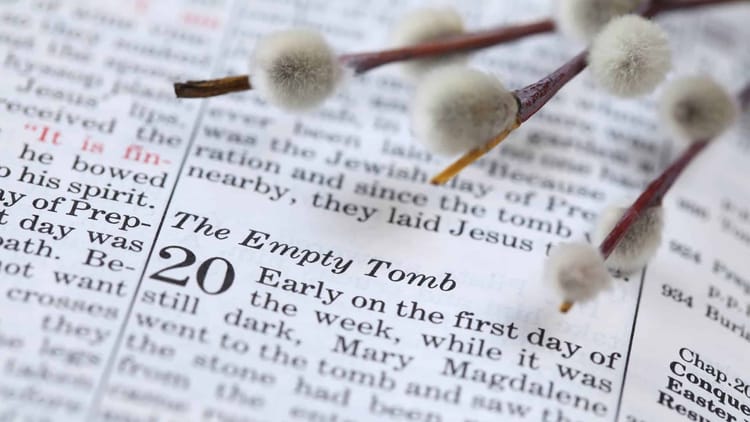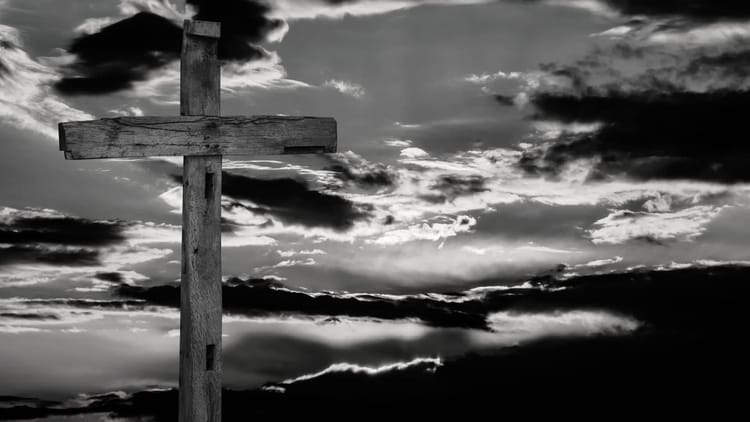How Can We Know What Happens After We Die?

Big Idea: How do we know what happens when we die? By listening to someone who’s come back from death.
As we’ve gone through this series, both Nathan and I have wondered at times how we got stuck with some of the topics. Two weeks ago I spoke on hell. Today I speak on death. Nathan is the guy who speaks on sex, and I’m the guy who speaks on death and hell. Go figure!
But tonight’s topic is an important one. Like many of us, I’ve had to wrestle with the question of death. A few weeks ago, on June 23, my half-brother passed away. That makes you confront again the question of what happens when we die.
I remember one cold February up in Stouffville when I stood beside the grave of a friend and led the committal service as her pastor. I remember having a distinct thought as I waited for everyone to get ready: Either I am about to share the best news possible about death, or I’m about to perpetrate one of the worst lies possible on some of the most vulnerable people. It’s as simple as that. Either Christianity has something valuable to say on death, or it’s the worst kind of lie. There’s really no in between.
Mike Wittmer, who’s written my favorite book on death — did you know I had a favorite book on death? — says this: “If death was no big deal, then there would be no reason to be a Christian.” The reason that Christianity packs such a punch is that it deals with death, which is in the end our last enemy, and one that we will all face.
So what happens when we die? Is Christianity true? How can we know what to believe? This is important, because we’re either going to hear reliable information today that changes everything, or Christianity simply isn’t worth our time.
And to answer this question, we first have to acknowledge how awkward it is to talk about death. It’s one of the reasons that this sermon is awkward. We don’t like to think about death. We spend a lot of our lives without really thinking about death. At funeral homes, many pay their respects and get as far away from the coffin as possible. We embalm to conceal the appearance of death. We use euphemisms to avoid acknowledging the reality of death. We no longer have graveyards, but cemeteries and memorial parks. We avoid making wills because we don’t want to think about our own death. You certainly don’t bring the subject of death up at a dinner party. But it’s important to break through the discomfort and talk about it, because we can’t avoid it no matter how hard we try.
Mike Wittmer says:
You are going to die. Take a moment to let that sink in. You are going to die. One morning the sun will rise and you won’t see it. Birds will greet the dawn and you won’t hear them. Friends and family will gather to celebrate your life, and after you’re buried they’ll return to the church for ham and scalloped potatoes. Soon your job and favorite chair and spot on the team will be filled by someone else. The rest of the world may pause to remember— it will give you a moment of silence if you were rich or well known— but then it will carry on as it did before you arrived. “There is no remembrance of men of old,” observed Solomon, “and even those who are yet to come will not be remembered by those who follow” (Ecclesiastes 1:11).
You are going to die. What a crushing, desperate thought. But unless you swallow hard and embrace it, you are not prepared to live.
It’s important, then, to sidestep the discomfort of death and think about it, because it’s inevitable, and unless we face its reality, we really aren’t prepared to live.
So what happens when we die? There are really only three theories. One is extinction: that we cease to exist. Another is that we come back in some other form, as in reincarnation. The third and final view is that we continue to exist as ourselves. Which one is true?
To answer this question, people try to look at things like past life memories and anecdotal evidence. There’s a lot of talk about near-death experiences, in which someone claims to have died, gone to heaven, and returned. I don’t find those helpful, though. There’s no way to judge the validity of those experiences. Earlier this year a publisher pulled the book The Boy Who Came Back From Heaven, a New York Times bestseller, after he recanted his story. “I did not die. I did not go to Heaven,” he said. “I said I went to heaven because I thought it would get me attention.”
So how do we get any reliable information? I believe that answer is Jesus. Jesus provides reliable information on death, because of who he is — God become man — and because he actually conquered death. When you want to find out what somewhere is like, ask someone who’s been there. And when you want to find out what death is like, ask the person who’s not only been there, but has conquered it, who has dragged death to the grave.
So let’s consider this afternoon: What did Jesus teach us about death? He said a lot, but I want to summarize it today by saying that Jesus taught three things: Death is an enemy. Death is not the end. And death will die.
First: death is an enemy.
You hear a lot of things about death. In The Lion King, Simba’s father says, “You see, it’s all part of the circle of life. There’s nothing unusual about death. It’s just the next step of growth. It’s just the next stage of life.” Not true! Others say that death is sleep, or going into a harbor. In 1910, King Edward VII of England caught a cold, developed bronchitis, then pneumonia, and was dead within a week. His funeral was preached by Henry Scott-Holland, the canon of St. Paul’s Cathedral, who uttered these words:
Death is nothing at all. I have only slipped away into the next room … Life means all that it ever meant. It is the same as it ever was. There is absolute unbroken continuity. What is death but a negligible accident? Why should I be out of mind because I am out of sight? I am waiting for you for an interval. Somewhere very near. Just around the corner. All is well. Nothing is past; nothing is lost. One brief moment and all will be as it was before. How we shall laugh at the trouble of parting when we meet again!
The problem with these words? They are a denial of the severity of death. Death is a huge deal. It is wrong. In John 11, Jesus stood beside the grave of his friend, and he read these powerful words:
When Jesus saw her weeping, and the Jews who had come with her also weeping, he was deeply moved in his spirit and greatly troubled. And he said, “Where have you laid him?” They said to him, “Lord, come and see.” Jesus wept. (John 11:33-35)
When it says that Jesus was deeply moved and troubled, these words are pretty powerful. It means that Jesus experienced anger, outrage, emotional indignation. What got Jesus so worked up? Was he just grieving for a friend? New Testament scholar D.A. Carson says: “His inward reaction was anger or outrage or indignation,” and then he suggests that his anger was a mix of anger “with the sin, sickness and death in this fallen world that wreaks so much havoc and generates so much sorrow,” and the unbelief of those around him who treated death as if there is no resurrection. In other words, Jesus didn’t see death as neutral, or just part of life. Jesus was indignant at death.
Let’s get rid of the idea that death is just part of life, or it’s a good thing. Death is unnatural. In 1 Corinthians, Paul says, “The last enemy to be destroyed is death” (1 Corinthians 15:26). It’s an enemy. Theologian Millard Erickson says:
Death, then, is not something natural to humans. It is something foreign and hostile. Paul pictures it as an enemy (1 Corinthians 15:26). And there is little doubt that God himself sees death as an evil and a frustration of his original plan.
Death is not good. Mike Wittmer once attended the funeral of an infant who had died in a tragic accident. The pastor offered the usual words of comfort: “We can rejoice, for this child is better off than we are. He isn’t really dead. He is more alive than he’s ever been, safe in the arms of Jesus.” Although there’s truth in those words, they don’t reflect the ugliness of death, or acknowledge that something horrible has happened. The grieving father stood up, and…
with quivering voice declared that no parent should ever have to bury their child. He pointed out that every death is ultimately the result of sin, and that when he held his dead son in the hospital, he thought he saw the face of sin. The mask of sin had been ripped away and he saw sin for what it is, the enemy that will one day steal from us everything and everyone we have ever loved. The father didn’t try to make us believe that all was well, but from the depths of despair he raised a fist of defiance. “People tell me that someday I will make peace with Jack’s death,” he said. “I will never be at peace with death. Scripture tells me that one day I will be at peace, but only when death is no more. I will not be at peace until I see my son again.”
That is the Christian view of death.
Death is not natural. It’s an enemy. That’s the first thing that Jesus teaches us.
Second, death is not the end.
The debate about what happens after we die is not a new one. The Sadducees, one of the major groups constituting Palestinian Judaism, did not believe that the soul continued to exist after death, or that people suffered punishments or received rewards after they died. They believed that the soul and the body perished at death. We don’t have to wonder what Jesus thought of this, because he told us. When they tried to trap Jesus by asking him a question about the resurrection, trying to trip him up, Jesus scolded them: “You are wrong, because you know neither the Scriptures nor the power of God” (Matthew 22:29). He then began to teach about the resurrection.
What did Jesus teach? He taught that when the body died, the soul did not. “And do not fear those who kill the body but cannot kill the soul. Rather fear him who can destroy both soul and body in hell,” he said (Matthew 10:28). He told a story, a parable, in Luke 16 about a rich man who died, as well as Lazarus, a beggar. Jesus described both of them as continuing to exist, one in heaven, and one in Hades, a place of torment. When he was dying on the cross, he told a criminal who was being crucified beside him: “Truly, I say to you, today you will be with me in Paradise” (Luke 23:43).
Jesus repeatedly spoke about the afterlife. Most clearly, he said this to Martha, the brother of Lazarus, at his tomb:
Jesus said to her, “Your brother will rise again.” Martha said to him, “I know that he will rise again in the resurrection on the last day.” Jesus said to her, “I am the resurrection and the life. Whoever believes in me, though he die, yet shall he live, and everyone who lives and believes in me shall never die. Do you believe this?” (John 11:23-26)
Jesus says here that he will raise the dead on the last day. The believer, even though he or she dies, will nevertheless come to life at the resurrection. In one sense, even though they die, they in some sense never die.
The New Testament develops all of this. You can summarize its teachings like this: upon death, believers go immediately to a place and condition of blessedness in God’s presence, and unbelievers enter an experience of misery, torment, and punishment. The body dies and disintegrates, but the soul lives on. But that’s not even the end. That’s just our souls. In John 5, Jesus said:
Do not marvel at this, for an hour is coming when all who are in the tombs will hear his voice and come out, those who have done good to the resurrection of life, and those who have done evil to the resurrection of judgment. (John 5:28-29)
Christ will raise our bodies from the dead when he returns, he says. Wayne Grudem explains what it will be like:
“Imperishable” means that they will not wear out or grow old or ever be subject to any kind of sickness or disease. They will be completely healthy and strong forever. Moreover, since the gradual process of aging is part of the process by which our bodies now are subject to “corruption,” it is appropriate to think that our resurrection bodies will have no sign of aging, but will have the characteristics of youthful but mature manhood or womanhood forever. There will be no evidence of disease or injury, for all will be made perfect. Our resurrection bodies will show the fulfillment of God’s perfect wisdom in creating us as human beings who are the pinnacle of his creation and the appropriate bearers of his likeness and image. In these resurrection bodies we will clearly see humanity as God intended it to be.
How do we know what happens when we die? Listen to Jesus. Jesus was not ambiguous. When the body dies, the soul continues to live. The body, too, will be raised to life again one day. How do we know what happens after death? Jesus told us.
There’s one more thing we learn from Jesus on what happens after we die.
Third, death will die.
This is the best news of all. Not only does Jesus promise resurrection, but he also promises to kill death. Death will die. The evidence for this is his own resurrection. I love how the spoken word artist Propaganda puts it:
His righteousness, His death, functions as Payment
Yes. Payment
Wrote a check with his life but at the resurrection we all cheered cause that means the check cleared
When Jesus rose from the dead, it showed us that he had triumphed over death. Death is defeated. Through death, he destroyed “the one who has the power of death, that is, the devil” (Hebrews 2:14). One preacher puts it this way: “The Christian teaching is the death of death in the death of Christ, the shaking of shaking in the shaking of Christ, the demise of demise in the death of Christ, the destruction of destruction in the destruction of Christ” (Tim Keller).
The poet George Herbert said, “Death used to be an executioner, but the gospel has made him just a gardener.”
This is the best news of all. Jesus “abolished death and brought life and immortality to light through the gospel” (2 Timothy 1:10). I heard of someone who attended the funeral of a child in Chicago in which the pastor shocked the mourners by glancing down at the coffin and interrupting his eulogy with the sudden exclamation, “Damn you, death!” Catching himself, he quickly added, “Not God— it’s death I’m damning. And God, too, has promised to damn it.” That’s exactly what is happening as a result of the cross. Death is being damned, and death will die.
How do we know what happens when we die? By listening to someone who’s come back from death. And that person tells us that death is an enemy, that death is not the end, and that death will die. Because Jesus lives, all those who trust in him will live too.
I can’t think of a better way to close this sermon than to close with the last paragraph of Mike Wittmer’s book on death. I told you it was good. Listen to what he says:
You are going to die. Take a moment to let that sink in. You are going to die. Death is the final enemy you will ever face, and Satan has saved his largest scare for last. But fear is no match for faith. Do you believe that Jesus swam the sea of death, scattered “the king of terrors” (Job 18: 14), and has now returned for you? Then climb on His back, and He will carry you. Here comes the fight of your life. Prepare to win.
Father, thank you for showing us what happens when we die. I pray that every one of us would realize that we will die, and then climb on his back, because he will carry us. I pray this in Jesus’ name, Amen.





